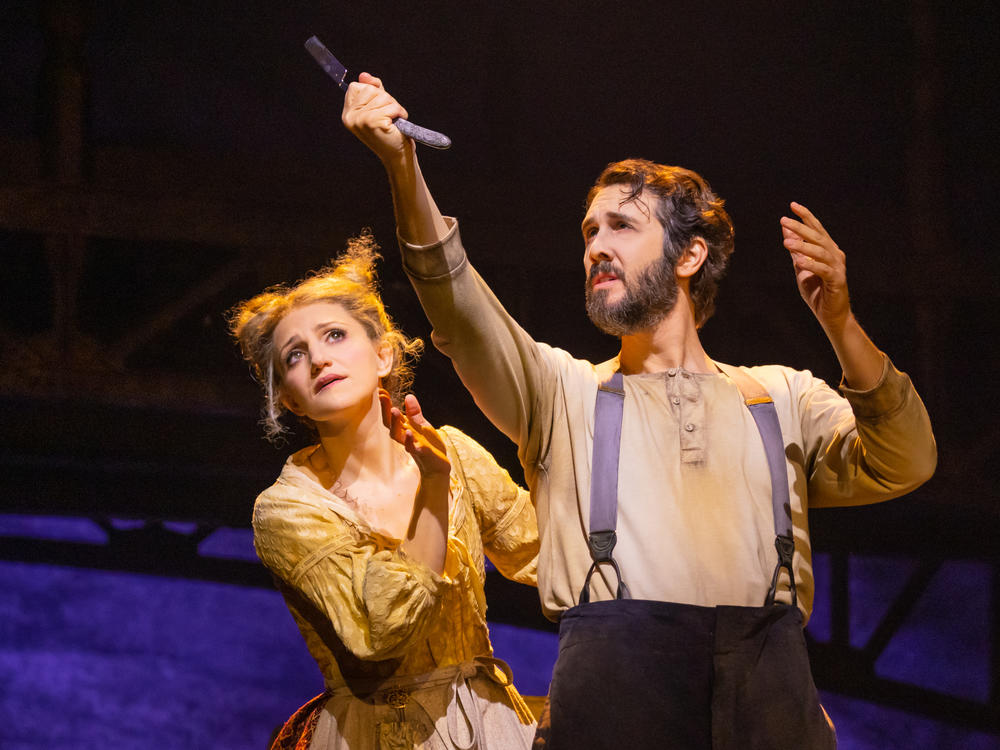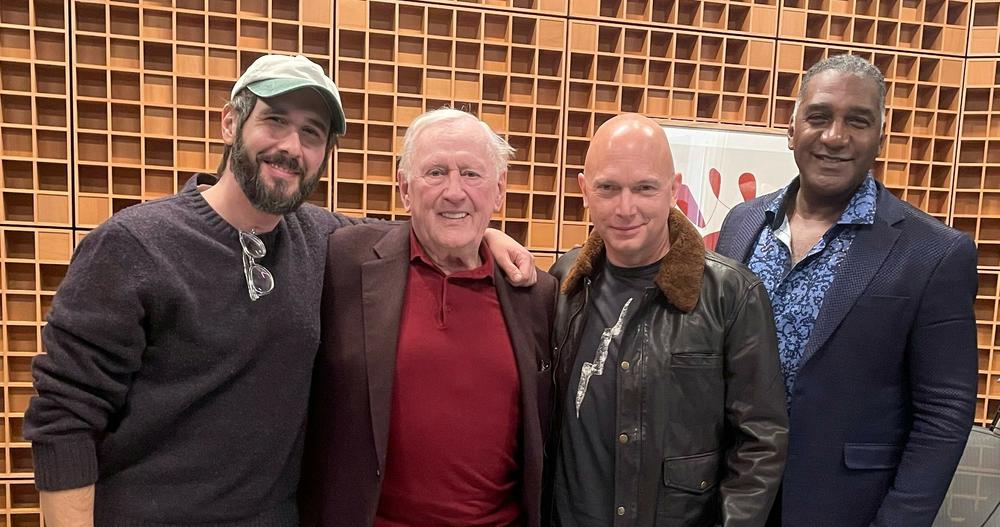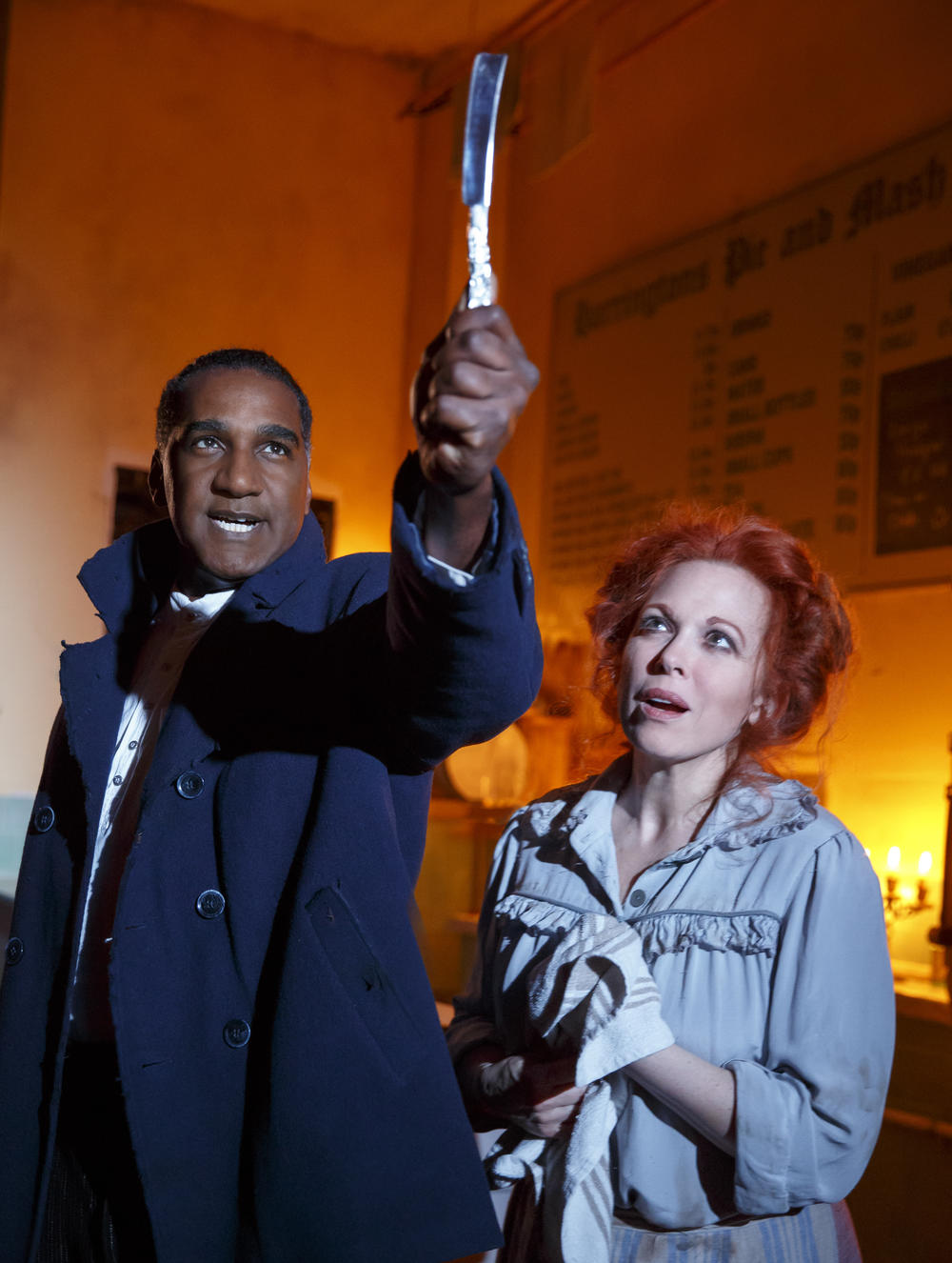Section Branding
Header Content
As 'Sweeney Todd' returns to Broadway, 4 Sweeneys dish about the difficult role
Primary Content
Stephen Sondheim's 1979 masterpiece, Sweeney Todd: The Demon Barber of Fleet Street, is back on Broadway. The tale of a murderous barber, who teams up with a pie shop owner in 19th century London, the show is gruesome, passionate and outrageously funny. And the lavish revival, featuring Josh Groban and Annaleigh Ashford, a cast of 25 and an orchestra of 26, recently opened to rave reviews.
Since its premiere 44 years ago, Sweeney Todd has returned to New York in various guises – small off-Broadway productions, operatic and concert versions, and a Broadway revival, where the actors performed their own accompaniment. So, there is a fraternity of Sweeneys, who can share stories and trade tips about playing the famously difficult role.
Four of them came to NPR's New York bureau for a wide-ranging conversation: pop singer Josh Groban, who's only recently taken on the part; Michael Cerveris, who fronted the revival in 2005, playing guitar, while Patti LuPone played the tuba; Norm Lewis, who's played the role three times, most recently off-Broadway in an immersive production set in a pie shop, and Len Cariou, the original Sweeney.
The three younger Sweeneys, naturally, were interested to hear Cariou talk about the first production. He was in Manitoba, Canada, when original director Hal Prince sent him the script. "And got home and then read it and said 'they're out of their minds. This is crazy,'" Cariou recalls, laughing.
Crazy, because the show is about a barber who slits the throats of his customers. And his partner in crime, Mrs. Lovett, disposes of the bodies by baking them into meat pies. But Cariou had worked with Stephen Sondheim before, on A Little Night Music. "And thought, 'Well. You know, if he writes a really romantic score, this might be interesting,'" he remembers, adding: "The guy's pretty smart, you know."
And Sondheim wrote a really romantic score. Cariou went to the composer's house for a preview, where both were so nervous, they shared a joint, before Sondheim demonstrated a few songs. Cariou says Sondheim showed him how "The Ballad of Sweeney Todd" used the "Dies Irae" from the Catholic mass for the dead. Then, he played an early song in the show, "The Barber and His Wife."
"And I just started to cry," says Cariou, "I said 'what is going on here?' I said, 'Steve that is an incredible melody.'" When Sondheim played the act one finale, a wickedly funny song called "A Little Priest," "I was on the floor laughing," remembers the actor, "and he said, 'It gets better!'" Cariou was hooked.
All four Sweeneys talked about a pivotal moment in the show; the song "My Friends," a tender ballad that Sweeney sings to his razors. Here's the set up: the corrupt Judge Turpin had lusted after Sweeney's wife, so he had him falsely convicted and sent to Australia. But Sweeney's escaped. Now, back in London thinking his wife dead and his daughter Johanna captive in the judge's house, Sweeney is determined to get his revenge. Then, Mrs. Lovett gives him the perfect instrument. "And says, 'Oh, by the way. I have your razors,' " Cariou describes, " 'I saved them for you.' "
"All of these stories are starting to develop," says Josh Groban. "These seeds are being planted that are maniacal. But the music itself is some of the most lush and romantic that I've ever heard. And "My Friends," I think, is the first opportunity as Sweeney to lean into that romanticism."
"Musically, it's sort of opening a door into a part of Sweeney that you haven't seen yet," explains Michael Cerveris. "You know, there is this loving person in him and there's a tenderness that you see in that song, in relation to these cold pieces of steel."
Cerveris adds: "I sort of felt if he had come back and found Johanna and his wife and been allowed to, he would have just left town. Like, I didn't feel like he was there to exact revenge, necessarily. But in 'My Friends' I think you see that that potential version of him."
"Yeah. I've always said to people," says Norm Lewis laughing, "if he had found Johanna and his wife. Curtain!"
But Len Cariou's not so sure. "He was going to have his pound of flesh," Cariou explains, "that was his motivation. That's what got him from Australia back to London ... was Turpin."
As the song goes on, Sweeney focuses on his razors, but Mrs. Lovett focuses on him. "There's a survivor element to Lovett," says Groban. "And they're both looking for a means to achieve what they need. These duets are crafted so brilliantly; to be able to show both of those plans happening simultaneously."
Cariou recalls the excitement of the original rehearsal room, where his Mrs. Lovett was Angela Lansbury. "Almost immediately everybody kind of sat up," says Cariou. "Something was happening. We knew it. We didn't quite know what it was, but we knew that something was going on here and that this may be the most exciting piece of theater that we'd ever been a part of."
Now, of course, Sweeney Todd is in the pantheon of musical theater. "I've always said that Stephen Sondheim was the musical theater Shakespeare," explains Norm Lewis. "And this role has always, for me, been the Hamlet of musical theater, because all the baritones always want to play this role and put their spin on it."
And all four of these actors acknowledge it's exhausting playing a murderous sociopath, while dealing with stage blood, a mechanical barber chair and singing complex music. Josh Groban says Michael Cerveris gave him tips. "Michael and I had a drink before we started previews," Groban recalls, "and I was lucky enough to kind of sit with him and get some wonderful advice and support ... And he said, 'just wash it off in the sink, man. Like, when you take the makeup off, take it all off, you know?'"
The musical's success, in 1979, was far from inevitable. Len Cariou remembers that the original company had never finished technical rehearsals before the first performance. They didn't know what to expect. "When it was over, people really reacted to it," says Cariou. "And I came backstage to my dressing room, and Sondheim was standing outside of it, and he said, 'They understood it. They f------ understood it.' And we had a great big hug."
Copyright 2023 NPR. To see more, visit https://www.npr.org.



